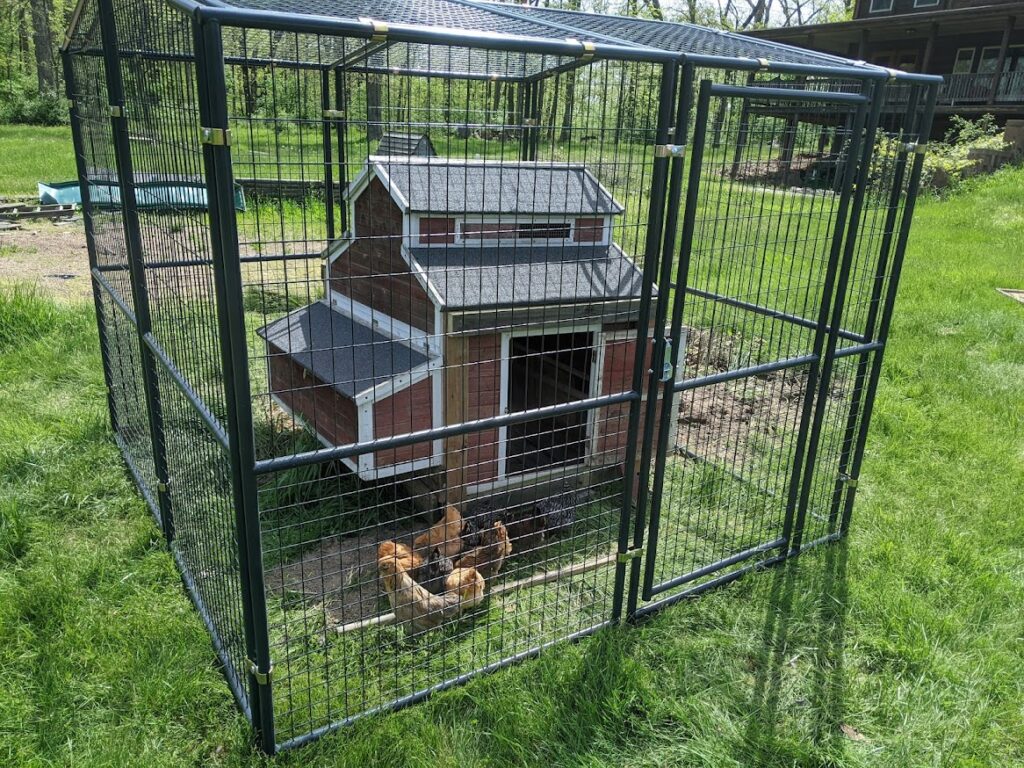
When we moved to the Twelve Acre Woods, one of the first projects was to start a flock of chickens. Since we had all this space, and no traffic or neighbors to worry about, we decided to make it a free-range operation. We figured the hens would be happier, they could help control the bug population, and it was just fun to watch them strut around the yard like tiny dinosaurs. However, as you might expect, eventually the predators found them – foxes, coyotes, raccoons, and hawks. Eventually, the flock was decimated and we decided we had to keep the few remaining hens confined. The small enclosure attached to the hen house, it turns out, was not impervious to a clever raccoon, and eventually, the entire flock was gone. We gave up on chickens.
Until this spring, that is. We decided to give it another go, but this time we would erect a very sturdy enclosure – steel, welded wire, heavy duty. I buried a foot or so of steel hardware cloth below the bottom edge of the pen to discourage digging under. We again have eleven hens, all confined to the pen, with a hen house inside. I have wondered, though, to the extent that chickens consider their own situation at all, do they resent being cooped up? Do they look at the green grass surrounding them on every side and wonder why they aren’t allowed out there? Or do they recognize that the pen is not so much to keep them locked in, but really it’s to keep all the predators locked out? I mean they’re chickens. Chickens are not really known for being clever.
I’ve been reading the story of Job in the Bible lately. If you’re not familiar with the story, in a nutshell, Job was a righteous man. Satan suggested to God that Job was only righteous because Job knew God blessed him as a result of doing the right things. God allowed Satan to destroy his family, his wealth, and his health – Satan’s hypothesis was that if all Job’s blessings were taken away, he would curse God.
As Job was considering his misfortune, several of his friends showed up and said, “Job, obviously you’ve committed some grievous sin, and that’s why this is happening.” Job protested that he did not deserve this punishment. Instead, he lamented that God was being unfair. Job and his friends went several rounds like this. Eventually God shows up and makes clear that Job is not God. The world is bigger than Job, God is in control of it all, and as hard as it may be, a better response is to trust God’s goodness.
What does this have to do with chickens? My chickens are confined, yes. And while they are just chickens, I care about them, and I have set boundaries for them for their good. Maybe they’d like to wander all over and see what the wider world has for them. They don’t know that there’s nothing better out there than what I give them – food, water, shelter.
But I too have often felt closed in, constrained in life, and wondering why God allowed whatever disappointment I was struggling with at that moment. God’s response to Job reminds me that he is not necessarily trying to keep me from some bit of pleasure or contentment, but rather, in the unseen parts of His plan, he is protecting me from something. Or that my temporary discontent is, unbeknownst to me, playing a role for good in His larger plan. And it isn’t that God doesn’t care about our heartbreaks and sorrows – He does. He doesn’t cause these things to happen to punish us, and He isn’t happy when they do happen. The question we each must decide is whether we will trust the heart of God – that he is good, and wants good things for us – or will we give in to resentment and harden our hearts? The latter confines me to looking out for myself, knowing only what I can see in front of me, fearful of what else may come. But the former leads to freedom in the knowledge that God is with me and for me.



